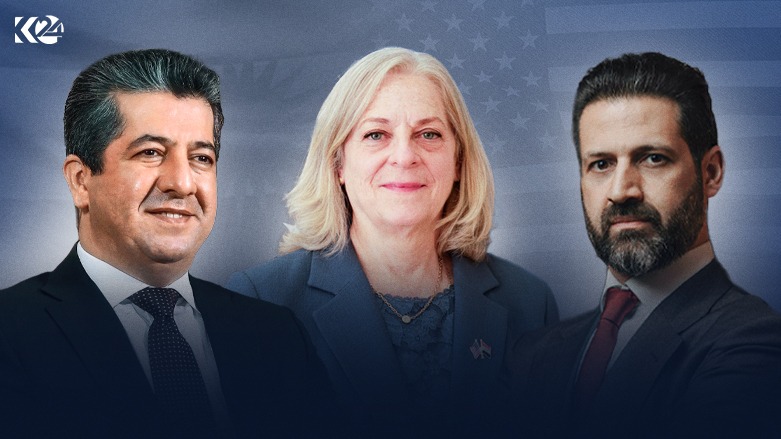U.S. welcomes Kurdish rapprochement, as it calls for further progress
Romanowski spoke with PM Barzani and Deputy PM Talabani, after which she tweeted her applause at "their successful dialogue," but also suggested more remained to be done: Peshmerga reform, human rights, elections.

WASHINGTON DC, United States (Kurdistan 24) – The U.S. ambassador to Iraq, Alina Romanowski, on Saturday, tweeted her appreciation of the progress that has been made in reconciling the differences between the two main Kurdish parties, the Kurdistan Democratic Party (KDP) and the Patriotic Union of Kurdistan (PUK.)
Romanowski had spoken with both Prime Minister Masrour Barzani and Deputy Prime Minister Qubad Talabani, after which she tweeted that she had “applauded their successful dialogue and progress through [the] Kurdistan Council of Ministers.”
But at the same time, she suggested that more remained to be done. “Encouraged both to strengthen cooperation on shared priorities—Peshmerga reform, dedication to human rights and elections by the end of 2023.”
Romanowski’s tweet echoed the statement made last Wednesday by Vedant Patel, State Department Deputy Spokesperson, “We commend the Kurdish parties for coming together to resolve issues through dialogue, and added “These steps are benefitted when its leaders are focused on the needs of the people, and we encourage them to build on the momentum.”
Read More: US Reiterates Support for Elections and Broad Political Reconciliation in Kurdistan Region
David Schenker is currently the Director of the Program on Arab Politics at The Washington Institute for Near East Policy. During the George W. Bush administration, Schenker was the Pentagon’s Levant Country Director, covering Syria, Jordan, Lebanon, and Israel. During the administration of Donald Trump, from June 2019 to January 2021, he was Assistant Secretary of State for Near East Affairs.
Kurdistan 24 asked Schenker about his view of the latest developments in the Kurdistan Region and the U.S. position.
Schenker welcomed the steps toward reconciliation between the KDP and PUK, but he also suggested that the position of the Biden administration was too hopeful.
“The KDP-PUK rift has been incredibly unproductive, both for the Kurds and for Iraq writ large,” Schenker said.
“But the continued Kurdish reticence to unify the Peshmerga and the threat that elections in the KRG will once again be delayed suggests the KDP and the PUK still have a long way to go in terms of cooperation and compromise,” Schenker continued.
Indeed, in a properly functioning democracy, elections are not arbitrarily delayed. That, in fact, is inconceivable, as elections are the expression of the popular will and not to hold them, as lawfully scheduled, is anti-democratic.
Thus, on Thursday, as the Special Representative of the United Nations Secretary-General for Iraq, Jeanine Hennis-Plasschaert, briefed the U.N. Security Council, she called on the Kurdish parties to overcome their differences and hold parliamentary elections this year.
“The Region’s elections are long overdue,” she told the 15 members of the Security Council. “Another postponement would be detrimental to public trust.”
Read More: Postponing Kurdistan Region’s elections again would be detrimental to public trust: UN Iraq envoy
Schenker thought the administration did not sufficiently appreciate the difficulties that remain, as he concluded, “While the thawing in intra-Kurdish relations is a welcome development, the Biden administration’s optimistic tweets about the renewed dialogue among parties is indicative of just how low Washington’s expectations are these days.”